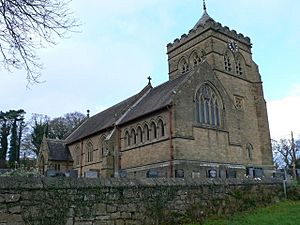Church of St Mary the Virgin, Halkyn facts for kids
Quick facts for kids Church of St Mary the Virgin, Halkyn |
|
|---|---|

Church of St Mary the Virgin, Halkyn, from the northeast
|
|
| OS grid reference | SJ 209 711 |
| Location | Halkyn, Flintshire |
| Country | Wales |
| Denomination | Anglican |
| History | |
| Status | Parish church |
| Dedication | Mary the Virgin |
| Consecrated | 29 October 1878 |
| Architecture | |
| Functional status | Active |
| Heritage designation | Grade I |
| Designated | 24 February 1983 |
| Architect(s) | John Douglas |
| Architectural type | Church |
| Style | Gothic Revival |
| Groundbreaking | 1877 |
| Completed | 1878 |
| Administration | |
| Diocese | St Asaph |
| Province | Wales |
The Church of St Mary the Virgin is a beautiful old church located north of Halkyn village in Flintshire, Wales. It's an active Anglican church, meaning people still go there for services. It's also a very important building, listed as Grade I by Cadw, which means it's a special historical site.
History of the Church
Imagine a church standing here for over 1,000 years! That's how long there has been a church in Halkyn. The church you see today, however, is much newer. It was built in 1878. The older church was taken down, and this new one was built in a slightly different spot.
A famous architect from Chester named John Douglas designed the church. The money for building it came from the 1st Duke of Westminster.
Church Design and Art
The church has a special layout. It includes a chancel (the area around the altar) and a main hall called a nave. The nave has four sections, called bays. There's also a side area called a north aisle, a porch on the south side, and a tower at the northeast corner.
The church's style is called Gothic Revival. This means it looks like older churches from the Middle Ages. It mixes two styles: Early English and Decorated Gothic. The church is built from stone, which is carefully cut and shaped both inside and out.
Inside, you'll find amazing wooden details. These were also designed by John Douglas. All the windows have colorful stained glass art. These beautiful windows were made by a company called Heaton, Butler and Bayne.
There's also a special stone carving of a crucifixion scene. It's found within a stone support, called a south buttress. This carving is very old, from the 14th century, and used to be part of a cross in the churchyard.
A historian named Hubbard thought this church was one of the best Victorian churches in the area of Clwyd. He also believed it set the standard for many other churches Douglas designed later.
See Also
 | Percy Lavon Julian |
 | Katherine Johnson |
 | George Washington Carver |
 | Annie Easley |

